The journey to Slievenamon is usually one of my favourite drives – narrow, country roads winding past pretty, pastoral settings before climbing up the path of the mountain – but not today.
Today, I see nothing but a thick blanket of fog as I ascend up the road; making my way to Tullahay Farm.
“Ah, you’re missing the beautiful scenery,” Rosemary Cleary O’Shea laughs as I pull into the drive.
Rosemary and husband Jim’s dairy farm is nestled into the foothills of Slievenamon, and on any other day we would be enjoying a magnificent view. But, really, I’m not here for the view – Rosemary’s story is equally spectacular.
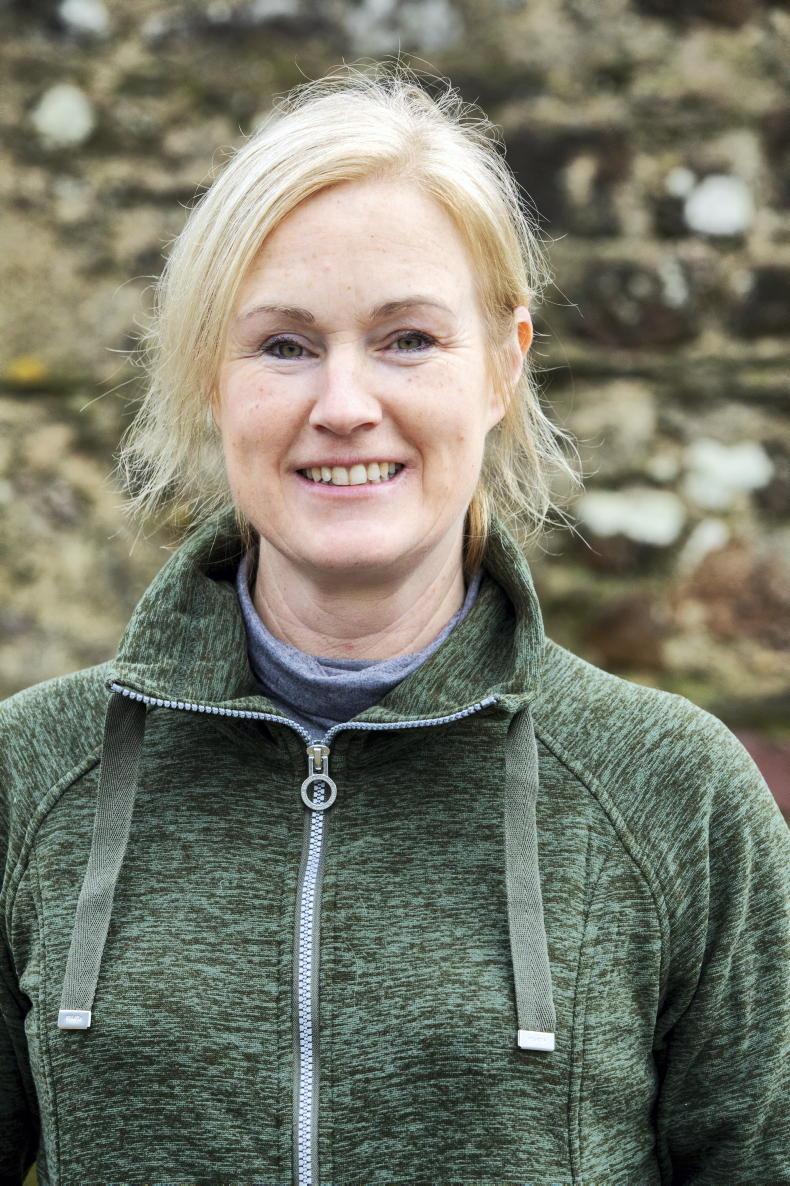
We had met previously at a Teagasc event in Kilkenny. It was her unique product line which initially drew me in: whey drinks, lightly flavoured with natural fruits. At the minute, Rosemary makes two flavours: raspberry bramble and mango and passionfruit (the latter recently won bronze in the Blas na hÉireann awards).
Liquid gold
“Why whey?” You might be wondering. At the time, I asked the same question.
“People buy whey protein powder all the time, but it’s much better to drink liquid whey,” Rosemary explains. “There are more minerals in liquid whey than in water and then you have the digestive enzymes. There is also a little protein, but it’s easily digestable. In powdered whey, you have 25% protein – your body can’t easily digest that.”
It’s important not to make health claims regarding any food product, but the connections between gut health and overall health and wellness (including mental health and healthy ageing) are becoming increasingly clear through scientific research. It has been proven that gut health is best maintained through a healthy diet; eating a variety of fresh fruits, vegetables, proteins and carbohydrates, as well as foods which contain healthy bacteria.
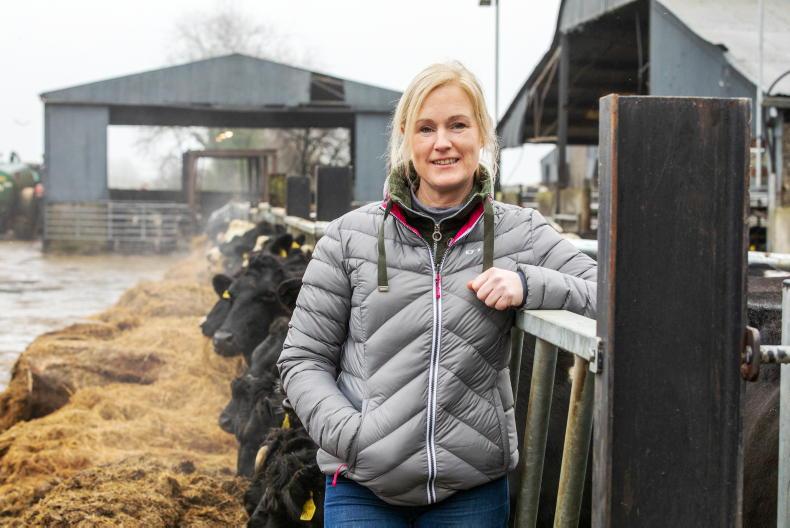
There is no shortage of fresh milk for Rosemary's products with their 200-head herd of Fresians. \ Claire Nash
Fermented foods like sauerkraut, kimchi, kefir and kombucha have become known as good “gut health” foods in recent years, and liquid whey contains similar good bacteria. It can also have the added benefit of being made with local Irish milk. Rosemary doesn’t have to travel far to get the milk for her products – it’s just a quick walk across the yard to the tank.
“In ancient Greece they called it ‘liquid gold’; people have been drinking whey for thousands of years,” Rosemary says. “If your gut is happy and healthy your overall health will be better, [the research out there] indicates this.”
Childhood tonic
While she also doesn’t make any health claims regarding whey, Rosemary can attest to drinking it while growing up and regularly feeding it to her three daughters.
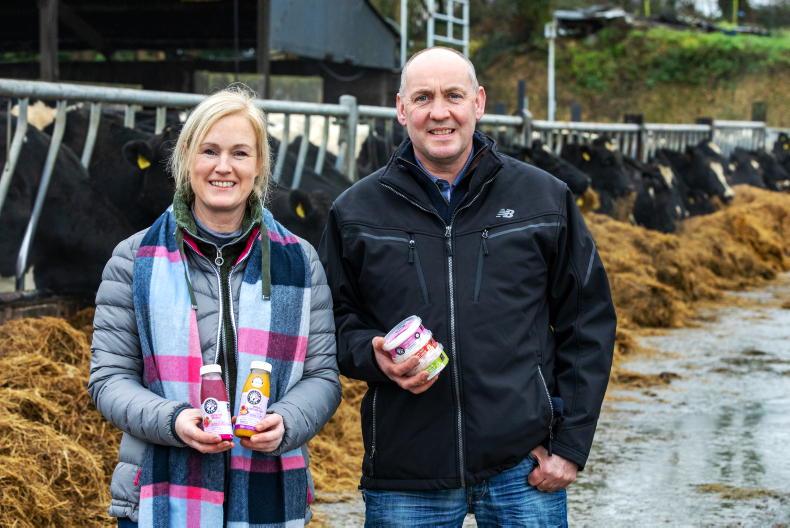
Rosemary and Jim milk their herd of Fresians and also keep chickens and pigs on their farm. \ Claire Nash
“I grew up with it, but it’s a new thing [for the Irish market] and requires some education,” she says. “We drank it every morning, but I’m not sure if other Irish families [did the same]. This was before the chemists had a tonic available for upset tummies. With my kids, if they came in with a bad tummy I’d just give them a dose.”
“When we were younger, we were all dosed with whey,” she continues. “My father’s mother, who lived next door in Ninemilehouse (where Rosemary grew up), was 96 when she died and I remember she would have her cheesecloths and the whey dripping down the whole time. She didn’t add any cultures to the milk; just let it curdle naturally and drank the whey. The good bacteria was in there; doing its job.”
Taking the plunge
Like many women on farms, for 25 years Rosemary combined farming while working in the local FBD office. Outdoorsy by nature; she never really felt at home in an office environment. 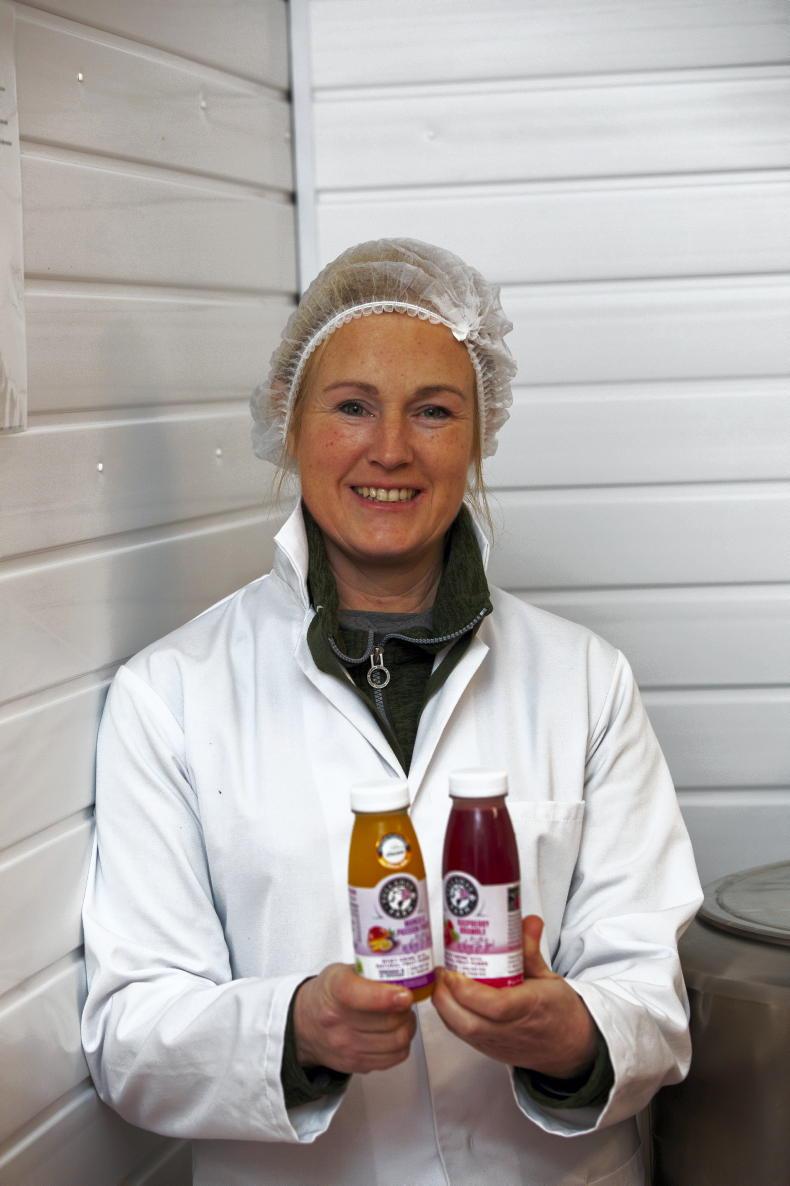
“The inside atmosphere was always a bit hard for me,” she explains. “I like physical work and, while I enjoyed the competitive side of the business – like hitting targets – and the social side, I would rather stay outdoors all day. At the time, Jim was up to his eyes with the farm and I knew I was needed so I said, ‘You know what? I’ll just quit’.
“That was two years ago,” she continues. “It was maybe a little bit rash but I had been getting up at half five, feeding 200 calves before getting the breakfast going, a quick shower and off to the work. Then I’d come home and couldn’t wait to get back up the yard to feed the calves again.”
A bright idea
It was during a busy calving season that Rosemary’s mother gifted her with a slow cooker. While slow cookers are great for saving time – especially during calving – Rosemary started using it for something else.
“I started experimenting with yoghurt,” she smiles. “I had leftover whey, so I started fermenting it with strawberries or blackcurrants. I’d put it up in the hot press for three days before taking it down and tasting it.

Jim and Rosemary’s farm is in the foothills of Slievnamon in south Tipperary. \ Claire Nash
I took the idea to the Local Enterprise Office (LEO) in Clonmel and they sent me off to get an innovation voucher. You can only apply for the innovation voucher if you have a limited company; it’s worth €5,000 and you pay the VAT back.
“The LEO recommended I go to St Angela’s College in Sligo to develop the product, but with a four-hour drive, it made more sense for me to go with Teagasc and Eddie O’Neill at Moorepark (Fermoy).
“I worked with Eddie for about six months,” she continues. “We decided against any additional fermentation and decided to lightly flavour the drinks with natural fruit puree. There aren’t many differences as to whether the drink is fermented or not; the natural bacteria is already in the whey and it sits in the tank for 24 hours – it’s naturally fermented that way. We experimented with flavour combinations and I had family and neighbours try it out.”
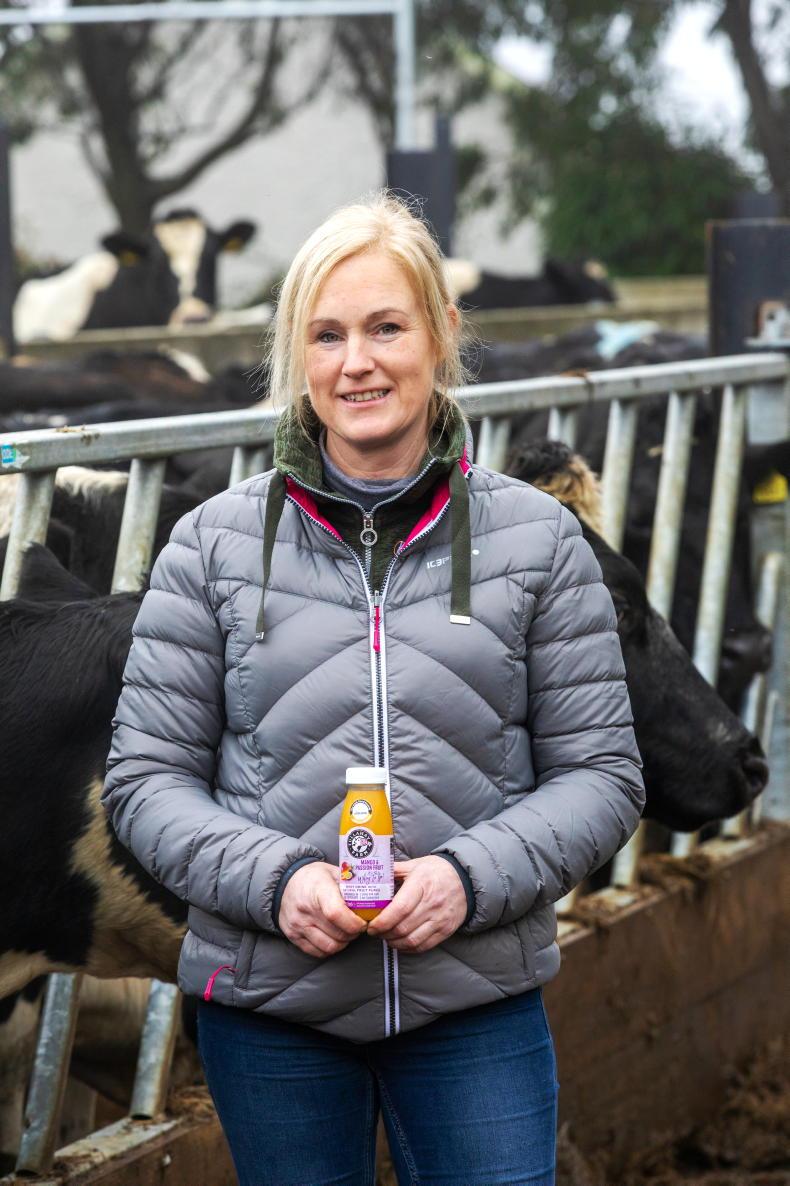
Rosemary loves the outdoors and combined farming with an office job for 25 years. \ Claire Nash
Zero-waste product line
Whey is usually a byproduct of cheesemaking – it’s the liquid that separates from the curds. In Rosemary’s case, the curds were the byproduct, and while she developed her drinks the pigs and chickens were enjoying the resulting curds for their farmyard dinners. She wanted to expand her product line with something which would make her business zero-waste while also filling a gap in the market.
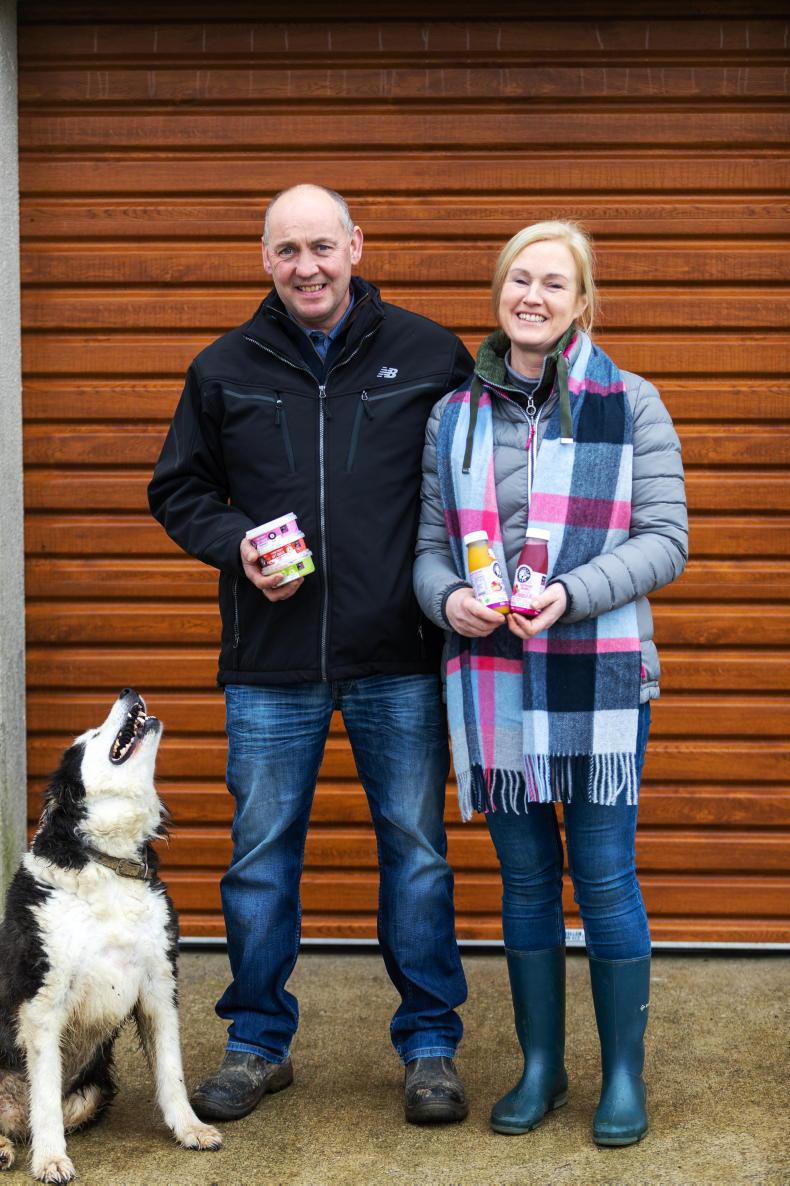
Rosemary and Jim in front of the production unit with one of their two farm dogs. \ Claire Nash
“I had so many curds,” she says. “The market is flooded with yoghurt, so I decided instead to make soft cheeses. I went into the supermarkets to do some research and I couldn’t find what I wanted to make – there was Philadelphia cheese and soft goat’s cheese, but not what I had in mind. So I experimented with some flavours (chilli honey and tomato basil and garlic) and we recently launched the plain soft cheese – so we suddenly have five products; all made here on the farm with our own milk.”
Looking to the future
Rosemary invested in a 110-litre pasteuriser to make her products and, at the moment, she is making around 30-40l per batch. She transformed her family garage into a licensed production unit and had a dressmaker friend make special muslin bags with handles. The bags are designed to be hung; allowing the whey to slowly drip through.
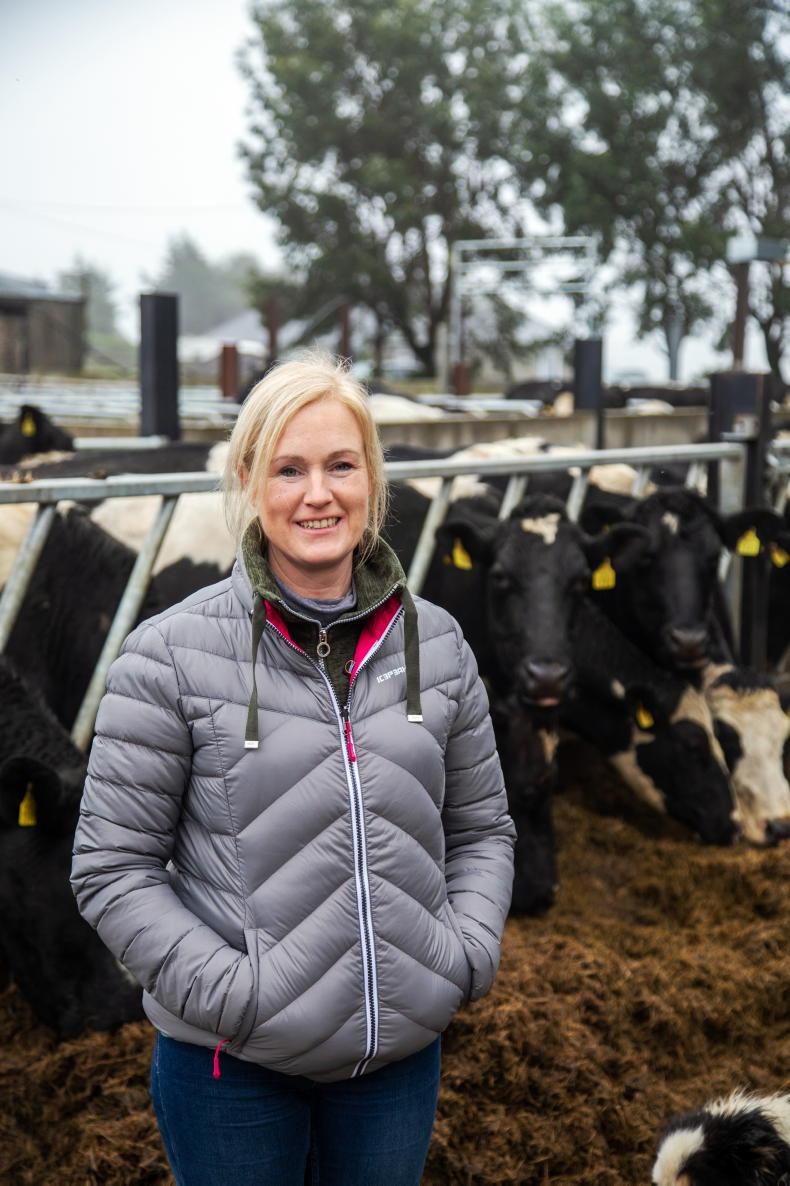
Rosemary says she has a real love of Fresians. \ Claire Nash
In the future she is considering larger-scale production for food service, but, at the moment, is happy selling her products in speciality shops like Ardkeen Stores in Waterford, select SuperValus, The Auld Mill Bakery in Grangemockler, Murphy Family Butchers in Callan and Lonergan’s Shop in Mullinahone. She is also hoping to sell in farmer’s markets in the coming months if COVID-19 allows.
“It’s only my two hands right now, so I make small batches,” she says. “I think it will take some time and engagement to educate the public on the drinks, but the interest is there. I love the outdoor aspect of what I do and it’s been great to show our girls what you can do with some hard work. It’s scary in a way but if you’re strong enough you can make it work.”
Read more
Brexit: ill-bred, selfish and can only lead to trouble
Specialist growers and mechanisation the future of vegetable production
The journey to Slievenamon is usually one of my favourite drives – narrow, country roads winding past pretty, pastoral settings before climbing up the path of the mountain – but not today.
Today, I see nothing but a thick blanket of fog as I ascend up the road; making my way to Tullahay Farm.
“Ah, you’re missing the beautiful scenery,” Rosemary Cleary O’Shea laughs as I pull into the drive.
Rosemary and husband Jim’s dairy farm is nestled into the foothills of Slievenamon, and on any other day we would be enjoying a magnificent view. But, really, I’m not here for the view – Rosemary’s story is equally spectacular.

We had met previously at a Teagasc event in Kilkenny. It was her unique product line which initially drew me in: whey drinks, lightly flavoured with natural fruits. At the minute, Rosemary makes two flavours: raspberry bramble and mango and passionfruit (the latter recently won bronze in the Blas na hÉireann awards).
Liquid gold
“Why whey?” You might be wondering. At the time, I asked the same question.
“People buy whey protein powder all the time, but it’s much better to drink liquid whey,” Rosemary explains. “There are more minerals in liquid whey than in water and then you have the digestive enzymes. There is also a little protein, but it’s easily digestable. In powdered whey, you have 25% protein – your body can’t easily digest that.”
It’s important not to make health claims regarding any food product, but the connections between gut health and overall health and wellness (including mental health and healthy ageing) are becoming increasingly clear through scientific research. It has been proven that gut health is best maintained through a healthy diet; eating a variety of fresh fruits, vegetables, proteins and carbohydrates, as well as foods which contain healthy bacteria.

There is no shortage of fresh milk for Rosemary's products with their 200-head herd of Fresians. \ Claire Nash
Fermented foods like sauerkraut, kimchi, kefir and kombucha have become known as good “gut health” foods in recent years, and liquid whey contains similar good bacteria. It can also have the added benefit of being made with local Irish milk. Rosemary doesn’t have to travel far to get the milk for her products – it’s just a quick walk across the yard to the tank.
“In ancient Greece they called it ‘liquid gold’; people have been drinking whey for thousands of years,” Rosemary says. “If your gut is happy and healthy your overall health will be better, [the research out there] indicates this.”
Childhood tonic
While she also doesn’t make any health claims regarding whey, Rosemary can attest to drinking it while growing up and regularly feeding it to her three daughters.

Rosemary and Jim milk their herd of Fresians and also keep chickens and pigs on their farm. \ Claire Nash
“I grew up with it, but it’s a new thing [for the Irish market] and requires some education,” she says. “We drank it every morning, but I’m not sure if other Irish families [did the same]. This was before the chemists had a tonic available for upset tummies. With my kids, if they came in with a bad tummy I’d just give them a dose.”
“When we were younger, we were all dosed with whey,” she continues. “My father’s mother, who lived next door in Ninemilehouse (where Rosemary grew up), was 96 when she died and I remember she would have her cheesecloths and the whey dripping down the whole time. She didn’t add any cultures to the milk; just let it curdle naturally and drank the whey. The good bacteria was in there; doing its job.”
Taking the plunge
Like many women on farms, for 25 years Rosemary combined farming while working in the local FBD office. Outdoorsy by nature; she never really felt at home in an office environment. 
“The inside atmosphere was always a bit hard for me,” she explains. “I like physical work and, while I enjoyed the competitive side of the business – like hitting targets – and the social side, I would rather stay outdoors all day. At the time, Jim was up to his eyes with the farm and I knew I was needed so I said, ‘You know what? I’ll just quit’.
“That was two years ago,” she continues. “It was maybe a little bit rash but I had been getting up at half five, feeding 200 calves before getting the breakfast going, a quick shower and off to the work. Then I’d come home and couldn’t wait to get back up the yard to feed the calves again.”
A bright idea
It was during a busy calving season that Rosemary’s mother gifted her with a slow cooker. While slow cookers are great for saving time – especially during calving – Rosemary started using it for something else.
“I started experimenting with yoghurt,” she smiles. “I had leftover whey, so I started fermenting it with strawberries or blackcurrants. I’d put it up in the hot press for three days before taking it down and tasting it.

Jim and Rosemary’s farm is in the foothills of Slievnamon in south Tipperary. \ Claire Nash
I took the idea to the Local Enterprise Office (LEO) in Clonmel and they sent me off to get an innovation voucher. You can only apply for the innovation voucher if you have a limited company; it’s worth €5,000 and you pay the VAT back.
“The LEO recommended I go to St Angela’s College in Sligo to develop the product, but with a four-hour drive, it made more sense for me to go with Teagasc and Eddie O’Neill at Moorepark (Fermoy).
“I worked with Eddie for about six months,” she continues. “We decided against any additional fermentation and decided to lightly flavour the drinks with natural fruit puree. There aren’t many differences as to whether the drink is fermented or not; the natural bacteria is already in the whey and it sits in the tank for 24 hours – it’s naturally fermented that way. We experimented with flavour combinations and I had family and neighbours try it out.”

Rosemary loves the outdoors and combined farming with an office job for 25 years. \ Claire Nash
Zero-waste product line
Whey is usually a byproduct of cheesemaking – it’s the liquid that separates from the curds. In Rosemary’s case, the curds were the byproduct, and while she developed her drinks the pigs and chickens were enjoying the resulting curds for their farmyard dinners. She wanted to expand her product line with something which would make her business zero-waste while also filling a gap in the market.

Rosemary and Jim in front of the production unit with one of their two farm dogs. \ Claire Nash
“I had so many curds,” she says. “The market is flooded with yoghurt, so I decided instead to make soft cheeses. I went into the supermarkets to do some research and I couldn’t find what I wanted to make – there was Philadelphia cheese and soft goat’s cheese, but not what I had in mind. So I experimented with some flavours (chilli honey and tomato basil and garlic) and we recently launched the plain soft cheese – so we suddenly have five products; all made here on the farm with our own milk.”
Looking to the future
Rosemary invested in a 110-litre pasteuriser to make her products and, at the moment, she is making around 30-40l per batch. She transformed her family garage into a licensed production unit and had a dressmaker friend make special muslin bags with handles. The bags are designed to be hung; allowing the whey to slowly drip through.

Rosemary says she has a real love of Fresians. \ Claire Nash
In the future she is considering larger-scale production for food service, but, at the moment, is happy selling her products in speciality shops like Ardkeen Stores in Waterford, select SuperValus, The Auld Mill Bakery in Grangemockler, Murphy Family Butchers in Callan and Lonergan’s Shop in Mullinahone. She is also hoping to sell in farmer’s markets in the coming months if COVID-19 allows.
“It’s only my two hands right now, so I make small batches,” she says. “I think it will take some time and engagement to educate the public on the drinks, but the interest is there. I love the outdoor aspect of what I do and it’s been great to show our girls what you can do with some hard work. It’s scary in a way but if you’re strong enough you can make it work.”
Read more
Brexit: ill-bred, selfish and can only lead to trouble
Specialist growers and mechanisation the future of vegetable production












SHARING OPTIONS